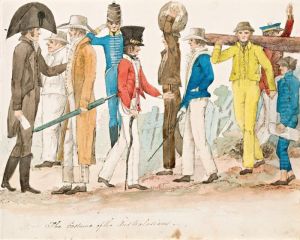Edward Close Paintings
Edward Close was an English-born artist, military officer, and settler who made significant contributions to early Australian colonial society. Born on March 24, 1790, in Bengal, India, where his father was stationed as an army officer, Close was sent to England for his education. He later joined the British Army and served during the Peninsular War against Napoleon's forces. His military career, marked by his participation in significant battles, laid the foundation for his disciplined approach to life and work.
In 1817, Edward Close was transferred to the New South Wales Corps and arrived in Australia. Settling in the Hunter Valley region, he became one of the first free settlers in the area, establishing himself on land granted to him by the colonial government in recognition of his military service. This land would eventually become part of the town of Morpeth, New South Wales, which he is credited with founding. Close played a pivotal role in the development of the region, contributing to its agricultural, economic, and social growth. He was a progressive farmer and entrepreneur, experimenting with different crops and techniques, and was instrumental in establishing infrastructure such as churches, schools, and roads, which facilitated the community's development.
Beyond his contributions as a settler and community leader, Edward Close is remembered for his artistic work. Although not a professional artist, he was a talented amateur painter and sketcher. His artworks provide valuable insights into early colonial life in Australia, depicting landscapes, buildings, and scenes of everyday life with a keen eye for detail. These works are significant historical documents that offer a glimpse into the environment and society of the time. They are held in various Australian public collections, including the National Library of Australia and the State Library of New South Wales.
Edward Close's legacy extends beyond his agricultural and artistic contributions; he was also active in civic affairs, serving in various official capacities, including as a magistrate. His leadership and vision were instrumental in laying the foundations for the development of the Hunter Valley region. Close passed away on May 7, 1866, in Morpeth, New South Wales, leaving behind a legacy of development and culture that would endure in the region. His life and work exemplify the multi-faceted contributions of early settlers to Australia's colonial history, encompassing military service, settlement and development, and the arts.
